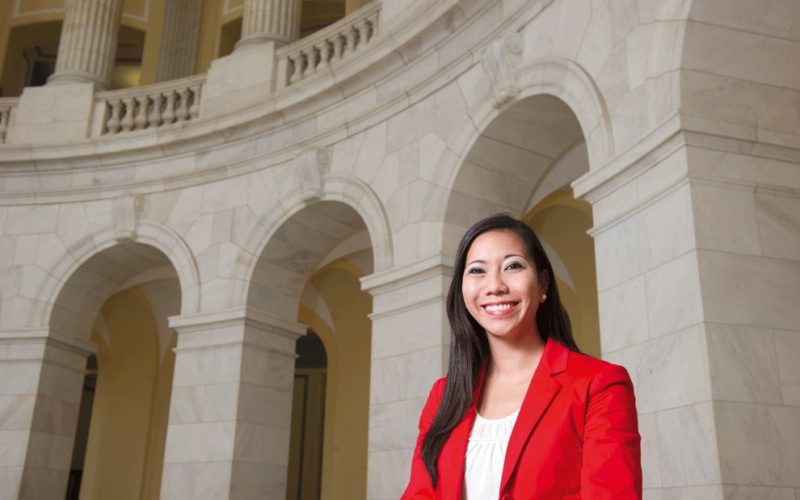Sign up here to receive The Yappie‘s weekly briefing on Asian American + Pacific Islander politics and support our work by making a donation.
President Joe Biden has selected longtime Capitol Hill staffer Krystal Ka’ai to lead the White House Initiative on Asian Americans, Native Hawaiians, and Pacific Islanders (AANHPI), according to a fact sheet obtained by The Yappie.
Ka’ai, the current executive director of the Congressional Asian Pacific American Caucus (CAPAC), will be tasked with coordinating the federal government’s response to the yearlong spike in anti-Asian violence.
Biden’s decision to tap Ka’ai is historic. In 2013, she became the first person of Native Hawaiian and Pacific Islander (NHPI) descent to head CAPAC, the caucus representing federal Asian American and Pacific Islander (AAPI) lawmakers. Ka’ai has an extensive history in AAPI advocacy, having served in various roles with the U.S. Senate Committee on Indian Affairs, the Office of Hawaiian Affairs, and the National Japanese American Memorial Foundation.
The White House Initiative on AANHPIs, previously known as WHIAAPI, is charged with improving AAPIs’ access to funding and resources, bolstering participation in federal programs, and encouraging AAPIs to pursue public service. Since its establishment in 1999, the entity has evolved to fit each administration’s policy priorities.
During the Bush and Obama administrations, the initiative moved from its original placement in the U.S. Department of Health and Human Services (HHS) to Commerce and Education. Former President Trump directed it back to Commerce and amended its objective to focus on business and economic issues. In February, AAPI Victory Alliance pushed Biden to revamp the initiative so staff are placed within a “centrally delegated authority” inside the White House or Eisenhower Executive Office Building to “ensure effective coordination.”
Biden signed an executive order on Friday re-establishing the initiative in HHS. The name of the office has been expanded to specifically recognize Native Hawaiians and the acronym “AANHPI.”
The order also renews the Presidential Advisory Commission on AANHPIs, which is expected to advise the president on federal grantmaking and policies “to address the intersectional barriers that AA and NHPI women, LGBTQ+ people, and people with disabilities face,” according to the White House.
In a document published after the attacks in Atlanta, the Biden administration pledged that it would “reinstate and reinvigorate” the initiative by giving it a broad mandate to “combat anti-Asian bias and violence, especially anti-Asian violence at the intersection of gender-based violence.” Last week, White House Press Secretary Jen Psaki told The Yappie the expansion would be a “top priority” for Biden.
“The COVID-19 pandemic, and the xenophobic rhetoric used by certain political leaders during this crisis, have led to a tragic spike in acts of anti-Asian bias, violence, and xenophobia. At the same time, the pandemic has disproportionately burdened many AA and NHPI communities, and exposed the significant health inequities faced by many Native Hawaiians and Pacific Islanders in particular,” the White House said in its fact sheet. “The new Initiative is charged with driving an ambitious, whole-of-government agenda to advance equity, justice, and opportunity for AA and NHPI communities.”
In addition to confronting anti-Asian hate crimes and discrimination, the new White House Initiative on AANHPIs will dive into a slew of policy goals driven by advocacy groups. One key priority is the lack of federal disaggregated data, a move experts say is critical to achieve a fuller understanding of the health, educational, and economic disparities among AAPI subgroups.
The revamped office will also focus on:
- “Expanding language access and language assistance programs” across federal programs.
- “Addressing the concentration of poverty experienced in many AA and NHPI communities.”
- “Advancing climate and environmental justice for AA and NHPI communities who are particularly impacted by the climate crisis and are overburdened by environmental degradation.”
- “Empowering AA and NHPI entrepreneurs, building new workforce training opportunities, and promoting workplaces that are free from harassment against AA and NHPI workers.”
- “Addressing disparities in educational outcomes for AA and NHPI students of all ages, and addressing bullying, harassment, and discrimination” in schools.
- “Strengthening public awareness and education about AA and NHPI communities, cultures, and traditions.”
The Biden administration faced initial backlash for failing to prioritize AAPI concerns. Despite demands from AAPI lawmakers, the president appointed the first Cabinet without an AAPI secretary in 20 years.
In March, Biden committed to appointing more AAPIs in key executive roles after Sens. Tammy Duckworth (D-Illinois) and Mazie Hirono (D-Hawaii) threatened to vote no on “all non-diversity” nominees. Last month, Biden tapped Erika Moritsugu to serve as deputy assistant to the president and senior liaison to the AAPI community.
Editor's note: This piece has been updated with the text of President Biden's executive order formally establishing the White House Initiative on AANHPIs.









